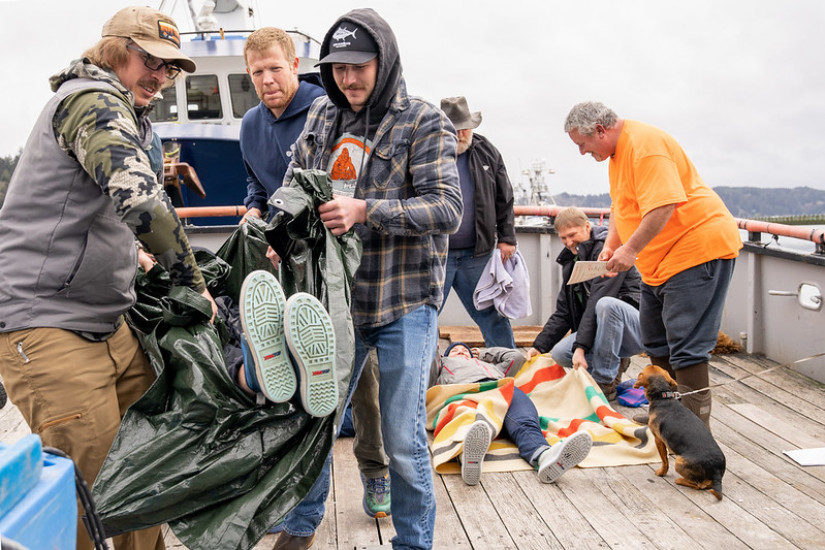Fishing First Aid & Safety Training (FFAST)

Photo: Trav Williams
commercial fishing is a challenging - and rewarding - occupation
The risk of injury is always present. Although the U.S. Coast Guard recommends one or more crewmembers to be first-aid and CPR trained, most first-aid courses assume there will be quick access to an ambulance and hospital. The more likely scenario: fishermen will need to use their training during a long, physically demanding day in rough seas.
This course is specifically designed for commercial fishermen, and customizes existing wilderness first aid training to better prepare fishermen to prevent and treat injuries encountered at sea.
The training considers small crews, common injuries, vessel environments, cold water, rough seas and delayed emergency response times. It includes additional topics that are of specific interest to people who work and/or recreate on the water. It addresses information relevant to the types of illnesses & injuries that are more common in marine environments, and is applicable to situations that might arise on the water.
free, 2-day training
FFAST is structured as a condensed, 2-day course so that working captains & crew can get back to fishing safely, (F)FAST! Full vessel crews are encouraged to attend. Successful completion of this course will fulfill the U.S. Coast Guard requirements for:
- Adult CPR & AED
- Basic First Aid
- Valid for 2 years
An example of the 2-day training is:
| Topics | Practice Skills |
| Scene Assessment | Securing the scene, immediate life-threatening injuries, hailing USCG, medical history |
| Trauma: Wounds, Bleeding, Burns | Direct pressure, tourniquets, wound irrigation & debridement, sterile dressings |
| Orthopedic: Sprains, Fractures, Overuse Injuries | Splints, slings, hazard assessment, ergonomics |
| Cardiac and Respiratory Issues | CPR, rescue breaths, AED, Epi pens, NarCan |
| Patient Packages & Carries | Emergency scenarios, spine stability |
| Topics | Practice Skills |
| Hypothermia & Environmental Injuries | Hypothermic "burrito", insulation, rewarming |
| Neurological Injuries, Head & Spinal Injuries | Assessing for stroke, diabetic shock, seizures, concussion, and skull fracture dressing |
| Abdominal Injuries & Illnesses | Symptom recognition & treatment |
| SKILLS PRACTICE | Run emergency scenarios on board a (docked) fishing vessel |
| Review & Paperwork | Jeopardy game, Q&A, issue CPR/AED/Basic First Aid certifications |
Free, 3-Day Training
CA Sea Grant has partnered with the Alaska Marine Safety Training Association (AMSEA) to provide both FFAST + AMSEA Drill Conductor trainings free of charge to our California commercial fishing fleets when possible. IF offered, we recommend that students take both courses consecutively in order to maximize the knowledge gained and skills practiced for overall best implementation of safety at sea.
An example of 3-day training is:
| Day 1 | Time | Topics | Practice Skills |
| FFAST | 8:30am - 4:30pm | Scene Assessment | Securing the scene, immediate life-threatening injuries, hailing USCG, medical history |
| FFAST | Trauma: Wounds, Bleeding, Burns | Direct pressure, tourniquets, wound irrigation, sterile dressings | |
| FFAST | Orthopedic: Sprains, Fractures, Overuse Injuries | Splints, slings, hazard assessment | |
| FFAST | Cardiac and Respiratory Issues | CPR, rescue breaths, AED, Epi pens, NarCan | |
| FFAST | Patient Packages and Carries | Emergency scenarios, spine stability | |
| Day 2 | 8:30am - 2:30pm | Hypothermia and Environmental Injuries | Hypothermic "burrito" |
| FFAST | Neurological Injuries, Head & Spinal injuries | Assessing for stroke, diabetic shock, seizures, concussion, and skull fracture dressing | |
| FFAST | Abdominal Injuries & Illnesses | Diagnosis and treatment | |
| FFAST | Drowning | Lecture only; intro to AMSEA man overboard/abandon ship | |
| FFAST | SKILLS PRACTICE | Run emergency scenarios on board a (docked) fishing vessel | |
| FFAST | Review & Paperwork | Jeopardy game, Q&A, issue CPR/AED/Basic First Aid certifications | |
| AMSEA | 3:00pm - 5:30pm | Paperwork | |
| AMSEA | 7 Steps of Survival | Emergency recognition, EPIRBs, MAYDAY calls | |
| AMSEA | Life Rafts | Deployment and familiarity | |
| AMSEA | Immersion suits and PFD's | Test out/try on various PFD's; order free AMSEA | |
| Day 3 | 8:30am - 5:30pm | Firefighting | Fire Extinguish |
| AMSEA | Signaling | Signal flares | |
| AMSEA | Flooding & Damage Control | dewatering pumps | |
| AMSEA | Possible Day 4 depending on pool schedule | Cold-water Survival Skills | In-water session |
| AMSEA | Man Overboard Recovery | In-water session | |
| AMSEA | Abandon Ship Procedures | In-water session |
This course meets the US Coast Guard training requirements for drill conductors on commercial fishing vessels, 46 CFR 28.270(c).
interested?
CA Sea Grant is gauging interest from regions across California to provide FFAST as well as the California Commercial Fishing Apprenticeship Program to your fleet. Email seacareers@ucsd.edu for more information and to let us know if you're interested in any of these opportunities, and we look forward to working with you to find the best times for your region's fishing season.